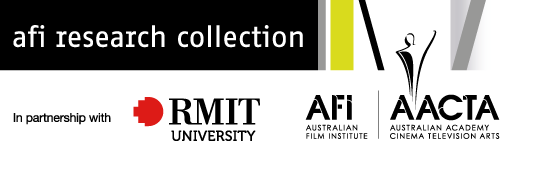An RMIT Culture Salon celebrating the AFI Research Collection Research Fellowship
For over 10 years, the AFI Research Collection Research Fellowship has supported scholars to delve into the wealth of the archive.
To celebrate the announcement of the recipient of the 2022 Research Fellowship, past fellows James Findlay (2021) and Jessica Balanzategui (2020) present their research, share the gems of Australian film & TV history they’ve uncovered within the archive, and screen a classic that asks the enigmatic question: Have you ever, ever felt like this?
A discussion and Q&A with host Stephen Gaunson will follow the presentations.
Date and time: Wed., 12/10/2022, 6:00 pm AEDT
Location: The Capitol 113 Swanston Street Melbourne, VIC 3000
Free admission – please register here
Our presenters
Jessica Balanzategui is a Senior Lecturer in Cinema and Screen Studies and the Deputy Director of the Centre for Transformative Media Technologies at Swinburne. She is the author of The Uncanny Child in Transnational Cinema (Amsterdam UP, 2018), and the Founding Editor of Amsterdam University Press’s book series, Horror and Gothic Media Cultures. Jessica’s widely published research examines entertainment cultures and aesthetics, with a particular focus on screen genres for and about children – particularly those that trouble expectations and definitions of “child appropriateness” – and horror and the Gothic.
Jessica will discuss key highlights from her AFIRC Fellowship, “Changing Children’s Television Genres in Australia and Changing Paradigms of Quality Child-Appropriate Television.” The project examines how the cultural and industrial landscape around children’s television transformed between 1960-2000, focusing on landmark shifts that impacted children’s genres and public perceptions of their “quality”. These developments include the introduction of the “C” (for children) rating in 1979 after five years of heated negotiations between government, policy, and industry, and the introduction of the Australian Children’s Television Foundation in 1982 and of children’s television standards in 1984. Jessica will outline some of the policy and industry advocacy that drove these shifts, and trace how shifting expectations around children’s television in Australia played out in news media commentary. This presentation will illuminate some surprising controversies and public debates as children’s television developed into a robust and internationally renowned sector of the Australian screen industry.
James Findlay is an Associate Lecturer in the discipline of History at the University of Sydney. His research interests lie in historical film and television studies, convict history and Australian popular culture. He has taught extensively at the University of Sydney and The Australian Catholic University in the disciplines of history and cinema studies and has previously worked as the Archival Project Manager for the Society of Australian Genealogists. He has also worked in film and television production, mostly in documentary, for companies including Beyond Television, Screenworld and Film Australia. James’s first book, Caught on Screen: Australia’s Convict History in Film and Television, is currently under contract with Bloomsbury Academic.
James will be discussing his AFIRC Fellowship project, Framing the frontier: Australian settler colonialism on television after 1970, which examines television’s representation of Australian frontier history over the past 50 years. As a mythic arena of pioneering, invasion, celebration and violence, the frontier on screen evokes historical experiences deeply intertwined with changing ideas of race, gender, and the legitimacy of the colonial project. This research is highlighting how television drama and documentary has ascribed meaning to the processes and outcomes of settler colonialism for audiences as well as TV’s role in shaping and reshaping attitudes concerning the most urgent and contentious Australian histories.
Stephen Gaunson is a Senior Lecturer in the School of Media and Communication at RMIT University. His books include The Ned Kelly Films (Intellect) and American-Australian Cinema (Palgrave). He has co-edited several collections on the history of film exhibition and distribution and writes extensively on film adaptation, Australian cinema and documentary.

